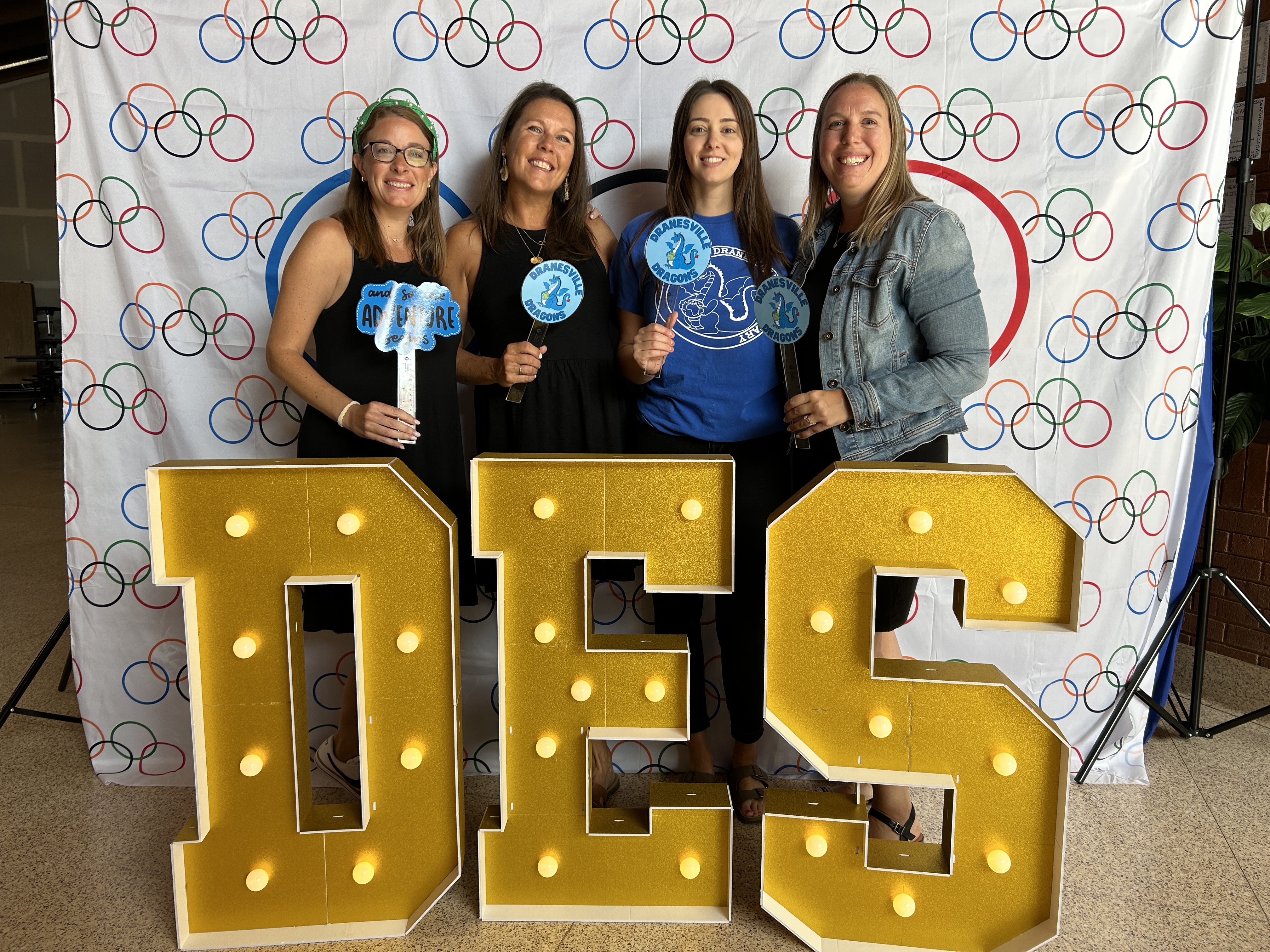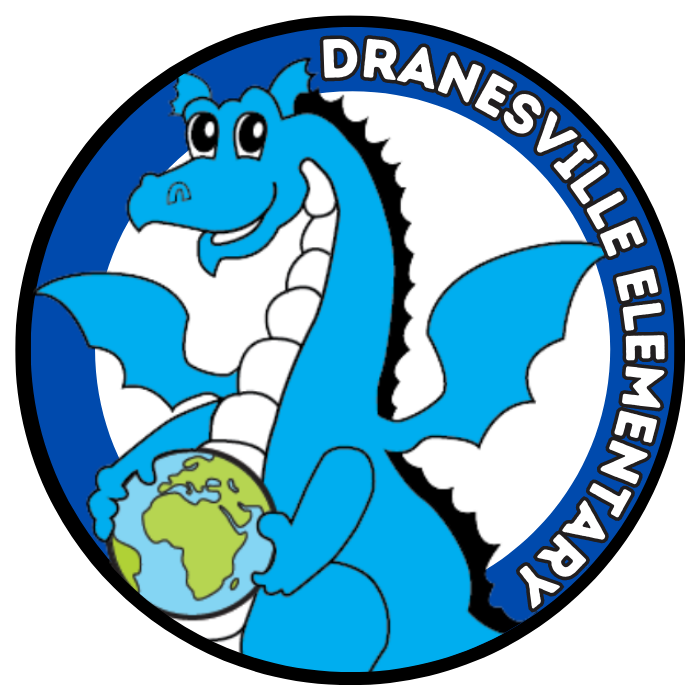School Clinical Team (Counselors, School Psychologist, School Social Worker)

From L to R:
Ms. Van Horn (Social Worker), Ms. Ryan (Counselor), Ms. Brouillard (Counselor), Ms. Jackson (Psychologist)
Meet our Clinical Team
- School Counselor, ES
School Counselor for Kindergarten, 1st, 3rd, and 5th Grades.
- School Social Worker
Counseling
Counseling
The Dranesville Elementary counseling program strives to help students reach their full potential by developing the knowledge, attitudes, and skills needed for students to be effective lifelong learners and productive members of society. Professional School Counselors empower students by addressing their academic, career, and personal/social needs. Collaboration with all stakeholders is also a key component in advocating for students’ academic achievement and personal/social growth.
What types of services are provided? The proactive services listed below are in accordance with the American School Counselor Association National Model and the Standards for School Counseling Programs in Virginia Public Schools.
Classroom Guidance Lessons: Classroom guidance is offered on a week to week or biweekly basis and consists of developmentally appropriate lessons that are designed to build on students’ personal/social, academic, and career development. We may discuss such topics such as bullying, feelings and emotions, conflict resolution, goal setting, study skills, academic responsibility, career exploration, etc.
Small Group Counseling: School counselors conduct planned small groups outside of the classroom to respond to students’ identified needs or interests (ASCA, 2005). Group counseling helps students build relationships and feel that they are not alone in their experiences as well as develop social skills. Some groups that could be offered this year include changing families, study skills and organization, friendship, dealing with deployment, social skills, etc.
Individual Counseling: Individual counseling is provided in a small group or on an individual basis for students expressing difficulties dealing with relationships, personal concerns or normal developmental tasks. Individual or small group counseling helps students identify problems, causes, alternative and possible consequences so they can take appropriate action. Such counseling is normally short term in naturel. School Counselors do not provide therapy. (ASCA,2005)
Other Services: Other services include parent workshops and instruction, consultation, crisis counseling, referrals, peer facilitation, academic planning, resource for parents and teachers…
How does a student meet with their school counselor? Permission forms will be sent home if counseling occurs on an ongoing basis. Also, please keep in mind that if a student meets with a school counselor, it does not mean he/she is in trouble.
• Parents/guardians may request their child see the counselor
• A staff member may refer a student to the counselor
• The counselor may invite your student to talk
• Your child may request to talk with the counselor
Confidentiality is respected. When talking with a school counselor, the discussion is confidential. The only time a school counselor will disclose confidential information is if you indicate that you are planning to harm yourself or someone else, or if someone is harming you.
School Psychologist
School psychologists apply a problem-solving approach to help bring about positive changes in learning environment, attitude, and motivation. Services offered by the school psychologist may be provided directly to the student or indirectly by working with teachers, parents, and other caregivers; however, all services provided by the school psychologist are intended to enhance the academic and social emotional success of students.
School psychologists promote the application of research-based psychological principles and practices that support the mental health and learning potential of all students in general education as well as special education programs.
School Social Worker
School Social Workers are dedicated to FCPS values outlined in Strategic Plan Ignite (Student Success, Caring Culture, Premier Workforce, Resource Stewardship) and Portrait of a Graduate; which drive our work with students, staff, and families. Fairfax County Public Schools Social Work Program follows the National School Social Work Practice Model as defined by School Social Work Association of America.
FCPS school social workers are committed to assessing and addressing those social, emotional, and behavioral factors that may stand in the way of students realizing their promise. They apply social work principles and methodologies in the educational environment with the primary goal of removing barriers that prevent a student from fulfilling his or her academic potential. Social workers are assigned to every school and center in the school system. Most social workers serve one to two sites.
Education, Training and Certification
School social workers have the knowledge, skills, and abilities that are fundamental to social work practice as well as specific training related to providing social work services in an educational setting. All social work staff members hold a Master of Social Work (MSW) degree and are licensed by the Virginia Department of Education. The majority of the staff are clinically licensed by the Commonwealth of Virginia Board of Social Work (LCSW) or by other jurisdictions and trained to provide mental health services in therapeutic settings.
How We Help Students, Families and Schools
- Provide individual and group counseling to students, using evidence-based practices and programs to develop social emotional competencies, foster resiliency, and cope with crisis situations and conflicts.
- Participate in student-centered meetings to address academic, mental health, and behavioral needs within the Responsive Instruction tiered system of support, including participating on multi-disciplinary teams and conducting sociocultural assessments to assist in determining eligibility for special education or Section 504 services.
- Provide crisis interventions to include conducting suicide risk assessments and threat assessments, also responding as part of crisis teams to support schools impacted by traumatic events.
- Connect students who are unable to attend school due to illness or disciplinary action with Out-of-School Support services and support their transition back to school settings through the Return to Learn process.
- Serve as liaison between home, school, and community. Family and community factors can influence learning, and school social workers focus on linking students and families to community resources to address issues such as poverty, chronic absenteeism, trauma, and child abuse. This includes providing case management and collaborating with community agencies to help families access services through Children’s Services Act (CSA), supporting students experiencing homelessness, and supporting military connected youth.
- Support and lead initiatives to address the needs of students including mental wellness screenings and activities, mentoring, and school resource fairs.
Provide education to staff and communities on topics such as trauma-informed practices, Kognito, and Youth Mental Health First Aid.

